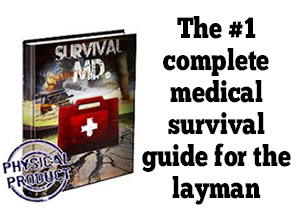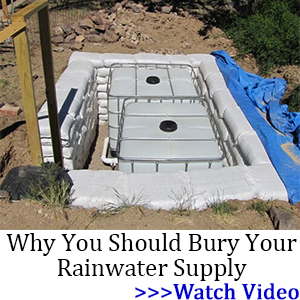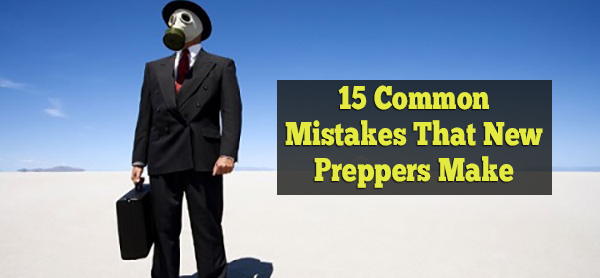The world is quickly changing and a lot of Americans can see and feel that this isn’t a good thing. Those who are awake to the lies of the MSM are planning ahead for when the SHTF, which is great, but many are going about it the wrong way. There’s more to prepping than hoarding.
Here are some mistakes that I made as a newbie prepper and how you can avoid them:
1. Not Having Both a Bug In and Bug Out Plan
Who knows how it will happen, but when it does, you need to be able to hunker down or bug out at a moments notice.
What will you do if you’re caught at work when things go down? If an EMP hit the US and you’re working 35 miles away from home, you better have a plan. If your car gets stuck with your family on the highway on a cold winter – you got to have a back-up plan. If your child is at school you got to get him… and so on. Read more on 7 Things You Should do Immediately After an EMP Strike.
Make sure your family has a destination to rendezvous and then a final destination to hunker down. That final destination should have all the necessities – food, water, weapons, cold and hot clothing and medical supplies.
If you’re planning to bug in because you have nowhere to bug out to, then reconsider where you live. If you live in a heavily populated urban city, then you’re already a target by millions. If possible, try to relocate to a place that is well outside of the city. You should also check out your neighbors before moving in to ensure they’re not a liability or threat during a major crisis.
2. Telling Others You’re Prepping
The first thing you should NOT do as a prepper is tell everyone you know that you’re prepping. Remember, when the SHTF, people are going to be without. Those closest to you may not rob you, but word tends to get around to others who might. The less people who know that you are prepping, the better. As a matter of fact, only immediate family members you don’t mind sharing your food and shelter with should be told (let them know to keep quiet about it). Store away all of your prepping gear so that visitors and guests won’t see it.
3. Not Considering Available Storage Space
You want to store a year’s worth of food, water and supplies, but realistically, how much storage space do you have to work with? If you’re a single person, then you won’t need as much space to store food and supplies. However, if you have a spouse and children, then you need to properly calculate how much food you need to survive for at least three months, and whether you have enough space to store all of it. If you don’t, then you need to make other plans – you can relocate to a bigger home outside of the city (preferably with a basement and/or attic) or buy a shed for your backyard. If you own your property, you can dig a cellar into the ground that’s hidden from view or even build your own mini bunker.
4. Failing to Accurately Calculate Supplies Needed
We have to bring this up again because it’s crucial for every prepper to know exactly how much they will need. This should be based on survival mode, which means calories will likely have to be cut. You still want to ensure that everyone gets three meals a day and consumes enough to have energy to move quickly if needed.
As for water, you want to ensure that everyone has a gallon of water daily. For a four-person family, this would equate to 84 meals and 28 gallons of water for one week. Don’t pay attention to the serving sizes on the boxes – they are unrealistic. It’s nothing but a marketing scheme to lower the calories on labels. So what you really want to look at is the calories. Determine how many calories are needed per person based on their age, gender, weight, etc. These calculators are readily available online.
5.Focusing On Food and Water and Nothing Else
Food and water aren’t the only necessities needed during a collapse of society. You need to make sure you have access to proper clothing, shelter, medications and hygienic supplies. You should also be realistic about the possibility of running into threats, and be ready to defend yourself.
Make sure to identify how much of the supplies you will need for your family size. Calculate how many bars of soap, deodorant, toothpaste, toilet paper, feminine hygiene products and laundry detergent are needed.
Related: What You Really Need in Your SHTF First Aid Kit
6. Not Prepping Your Family
If the economy was to collapse tomorrow and everything was shut down, how would your children and spouse react mentally? In the event of an EMP attack, would they be able to handle not having access to electronics? Also, if they had to hike a long distance, climb fences and sleep outside, would they be able to?
One way to get everyone prepared is to practice. Designate a certain day of the week or month as no electronics day. Go out camping on occasion to get used to the outdoors and making food outside of a kitchen.
7. Failing to Practice Survival Techniques
If someone were to get a really bad cut, who would be able to stitch it together and prevent a lethal infection?
Few people have any first aid knowledge, which would take your family back hundreds of years when people died of fever, flu and infections.
You can learn a lot about medical techniques for various ailments to ensure you have the right supplies and gear to treat them. You should also practice swimming and carrying a body (reenacting someone drowning). Also, what about fishing for food, in the event you had to leave your bug out location?
There are many survival techniques everyone needs to familiarize themselves with – don’t wait until the SHTF to start learning.
8. Storing Everything in One Place
Many of us know that thieves (government and fellow citizens) can come to your home after the SHTF to steal your belongings. This is the main reason why you don’t want to put all of your eggs in one basket. Make sure that you have food, water and supplies hidden throughout the home and even at other locations. You never know if you may have to leave your bug in location, so make sure you have supplies elsewhere. It’s a good idea to keep food and supplies in the trunk of your car as well.
9. Never Learning to Operate a Gun
Not knowing how to operate a gun can be dangerous in two ways – you could accidentally hurt yourself or a loved one, or you may fail to shoot an attacker and end up getting badly injured. It’s a good idea to teach your family how to properly handle and shoot a gun. Educate everyone about where the gun will be hidden (if you have one) and scenarios when it’s justifiable to get it. If you have young children, make sure they know not to touch the gun.
10. Buying Fancy and Unnecessary Survival Gear
There is definitely a large market for preppers, so you’ll come across all types of shiny new toys that you can add to your collection. However, this isn’t the time to impress your friends and family with your fancy gadgets. Really think twice about every piece of gear you purchase to determine whether it’s a necessity or a luxury. Also, ask yourself if it’s practical – do you have the experience to use it or will you ever really need to? Focus on increasing your knowledge, just as much as you’re increasing your pool of survival gear.
11. Failing to Collaborate with Others
Having an “us against the world” mentality isn’t the best way to handle SHTF situations. You have to face the fact that there are billions of people in this world, so it’s impossible to take on the world by yourself. Consider collaborating with neighbors and others in your community who are like-minded. The more people in your camp, the better your chances of survival. Think about what people do you really need in your SHTF team?
12. Not Investing in Survival Books and Manuals
 Not everyone’s a Navy Seal or an Eagle Scout. So for those who haven’t received hands-on training in survival skills, studying a quality survival manual is your best option.
Not everyone’s a Navy Seal or an Eagle Scout. So for those who haven’t received hands-on training in survival skills, studying a quality survival manual is your best option.
“I don’t know about you, but I don’t trust the United States government any further than I can throw it. That said, I will still read Military Manuals for survival information. Why? Well because you know it’s battle tested. The amount of research and testing that goes into creating military manuals is huge.” (Source)
13. Focusing On Supplies vs. Skills
There are many things we’ve lost to history. Few really know how to farm, garden, sew and homestead. Even fewer know what to do during disastrous events, such as a flood, earthquake or nuclear explosion. Filling in these gaps of knowledge is key in life or death situations.
14. Buying Too Much of the Same Food
Your body requires different types of nutrients to survive. One mistake newbie preppers make is buying a bunch of salt, beans, rice, sugar and flour. If this isn’t what you normally eat everyday, your body is going to have issues adjusting. Make sure you’re getting well-balanced and nutritious meals.
15. Using Supplies You Stored
It’s very important to refrain from using the supplies you’ve bought for emergency situations. There’s no problem rotating food and water – just make sure you’re replacing whatever you use. In fact, this is recommended, so you don’t end up with a bunch of stale food when things finally go awry.
Prepping isn’t a trend, it’s a lifestyle. It’s time to start treating it as such, so you don’t end up making these ill-fated mistakes!
You may also like:
 What a Prepper Should Do Around The House
What a Prepper Should Do Around The House
Arizona Farmer Accidently Discovers Trick to Turn Air into Water (Video)
12 Urban Survival Mistakes You Need to Avoid
A Small, Super Survival Shelter
You Will Not Survive an EMP Strike Without This















A very common one is believing that because you have a gun, that you can take all comers. An ak47 doesn’t help in the least if someone shoots you at long range.